The cloud computing boom shows no signs of slowing down in 2025. Enterprises worldwide are rapidly migrating to cloud platforms, driving surging demand for certified cloud professionals.
In fact, global cloud spending is projected to soar 21.4% to $723.4 billion in 2025. (Source: Gartner) As organizations embrace multi-cloud strategies, IT professionals with AWS, Azure, and Google Cloud certifications stand to benefit from abundant job opportunities and premium salaries.
In this blog, we’ll explore the top five cloud certifications for 2025, why they matter, and how they can turbocharge your career. We’ll cover the latest market trends, regional demand, career benefits, real success stories, and tips to help you ace these certification exams. Whether you’re a fresher or a mid-level professional, this guide will show you why now is the perfect time to invest in cloud certifications and how to get started.
Overview of AWS, Azure, and GCP Certifications
Cloud certifications validate your expertise in designing, deploying, and managing cloud solutions. In 2025, with cloud adoption at an all-time high (over 96% of companies use public cloud services), these certifications carry more weight than ever.
💼 Hiring managers view them as proof that you have the skills to maximize cloud ROI and maintain a competitive edge in a digital-first world.
According to industry research, 70% of IT professionals are expected to have cloud-related certifications by 2025, underscoring how prevalent and essential these credentials have become.Each major cloud provider – Amazon Web Services (AWS), Microsoft Azure, and Google Cloud Platform (GCP) – offers a portfolio of certifications from foundational to expert levels.
For 2025, the most valuable certifications include the flagship credentials from each provider:
AWS Certified Solutions Architect – Professional (or Associate):
AWS remains the cloud market leader with about 31% market share. The Solutions Architect certification (Associate for entry-level architects, Professional for seasoned experts) is highly sought-after. It proves you can design scalable, secure AWS architectures using best practices. With AWS’s vast adoption, this cert is a gold standard for cloud architects.
Microsoft Certified Azure Solutions Architect Expert:
Azure holds the second-largest share (around 21% of the market) and is trusted by over 95% of Fortune 500 companies for cloud services (Source: azure.microsoft.com). The Azure Solutions Architect Expert certification validates advanced skills in designing solutions on Azure (covering compute, storage, security, and networking). As Azure’s enterprise footprint grows, this expert-level cert is extremely valuable in 2025.
Google Cloud Certified Professional Cloud Architect:
GCP is the fastest-growing of the big three, now accounting for 12% of the cloud market and expanding its reach in data analytics and ML services. Google’s Professional Cloud Architect certification demonstrates the ability to design and deploy robust applications on GCP. In a multi-cloud era, GCP expertise is a great asset, and this cert has ranked among the top-paying IT certs in recent years (it was the #1 highest-paying cert in some surveys).
AWS Certified DevOps Engineer – Professional:
DevOps in the cloud is huge in 2025. This AWS certification proves you can automate deployments, manage infrastructures with code, and implement CI/CD pipelines in AWS. With many companies modernizing their IT, certified DevOps Engineers are in high demand to bridge development and operations on AWS. This professional cert signals mastery of advanced AWS services (CloudFormation, CodeDeploy, CI/CD tools, etc.) to enable agile, reliable cloud operations.
Microsoft Certified: Azure Administrator Associate (AZ-104):
For those managing cloud environments, the Azure Administrator cert is incredibly valuable. It covers day-to-day Azure resource management – configuring VMs, storage, networks, and identities. Organizations running hybrid clouds love Azure Administrators to manage their cloud infrastructure. This certification is often a stepping stone to more advanced Azure roles, and remains one of the most popular Azure certs in 2025.
These five certifications represent high-impact credentials that align with the skills employers need most. Next, we’ll examine the market demand behind each of these certs and why employers are eager to hire professionals who hold them.
Market Demand for Each Certification
The global demand for cloud expertise is exploding. Industry forecasts show demand for cloud computing skills will grow by 25% in 2025. Every region – from North America and Europe to Asia-Pacific – is seeing a cloud talent crunch, as 60% of organizations expect a shortage of skilled cloud professionals this year. Cloud certifications directly address this skills gap by validating the expertise employers are desperately seeking.
Let’s break down demand trends and job markets for our top five certifications:
AWS Certified Solutions Architect:
AWS’s dominance means AWS architects are needed almost everywhere. LinkedIn job searches reveal over 45,000 AWS Cloud Engineer openings (vs 24,000 for GCP) at a given time. North America leads in AWS job opportunities, with companies of all sizes migrating to AWS.
Europe and Asia-Pacific also show strong AWS adoption – for example, Asia-Pacific cloud spending is “skyrocketing” with ~14% annual growth through 2027, leading to a surge in AWS projects. Certified AWS Solutions Architects can find roles worldwide, often with premium salaries.
In the U.S., the average AWS Solutions Architect earns about $150,000 per year. In Europe, median salaries are around £60,000 in the UK, and in the Asia-Pacific region, salaries are rising fast (in India, an AWS Architect averages ₹2 million annually). The global cloud boom ensures that AWS certified architects are highly sought after across all regions.
Azure Solutions Architect Expert:
Azure’s growth is fueled by its enterprise presence and hybrid cloud offerings. Azure roles are especially hot in regions with large enterprise and government uptake – for instance, Europe (where many organizations are Microsoft-centric) and North America. Over 95% of Fortune 500 companies use Azure (Source: azure.microsoft.com), which means certified Azure architects are in demand to design solutions for large, complex environments.
Azure’s market share gains (it grew to ~23-24% by late 2024 - Source: fierce-network.com) translate to more Azure job postings globally. The Azure Solutions Architect Expert cert often leads to high-paying roles – median salaries for Azure architects are comparable to AWS, often in the $120k+ range in the US, with Europe and APAC offering competitive rates (and the benefit of huge demand with slightly fewer certified experts available than AWS). Many cloud job listings in finance, healthcare, and government prefer Azure-certified professionals due to Azure’s strong security and compliance features.
GCP Professional Cloud Architect:
GCP’s niche in big data and machine learning means certain industries have a strong preference for Google Cloud skills (e.g., analytics companies, some tech startups, and multi-cloud organizations). While GCP’s overall market share is third, its growth rate is high and job openings for GCP skills are climbing.
Globally, companies adopting a multi-cloud approach want GCP Architects to optimize Google Cloud alongside AWS/Azure. Job demand for GCP-certified professionals is particularly notable in North America (Google’s home turf) and increasing in Asia-Pacific where GCP is expanding. Salaries for GCP Professional Cloud Architects are among the highest in the industry – this cert famously topped Global Knowledge’s salary survey in past years, with average salaries reported around $175,000 in some regions.
Currently, in the U.S., Google Cloud engineers average about $141,000 per year, on par with AWS roles. The relatively smaller talent pool for GCP (fewer people hold GCP certs compared to AWS/Azure) means GCP-certified architects can command premium pay and often find less competition in the job market.
AWS Certified DevOps Engineer:
The push for cloud automation and DevOps practices has made AWS DevOps expertise extremely valuable. Globally, organizations migrating to AWS also want to modernize their workflows – CI/CD pipelines, infrastructure as code, and automated cloud deployments. This certification is in high demand for roles like DevOps Engineer, Site Reliability Engineer (SRE), and Cloud Automation Lead.
In regions like North America and Europe, where DevOps adoption is mature, having an AWS DevOps Pro cert sets you apart for top-paying jobs (often $120k–$150k+ annually for experienced engineers). Even in emerging tech hubs across Asia-Pacific, cloud DevOps roles are booming as businesses leapfrog to cloud-native operations. The DevOps Engineer role was cited as one of the top 10 cloud jobs, and AWS-certified DevOps professionals are seeing strong hiring interest across the board. If you’re eyeing roles that blend development and operations in the AWS cloud, this certification will open doors.
Azure Administrator Associate:
Market demand for Azure Administrators is robust, especially in enterprises that use Microsoft stacks. Globally, over half of large organizations using Azure need certified admins to manage cloud resources day-to-day. This certification is often a requirement (or a strong preference) for roles like Cloud Systems Administrator, Azure Engineer, or IT Infrastructure Lead in Azure environments.
In regions such as North America, Western Europe, and parts of Asia (like India and Southeast Asia where Azure is popular in enterprises), there’s a steady demand for Azure Admin skills. Salaries for Azure Admins tend to be slightly lower than architect-level roles but still very competitive – in the US around $90k–$110k, in the UK around £50k–£65k, and growing in APAC. Importantly, this cert often serves as a gateway to more advanced Azure roles (many Azure Admins go on to become Azure Architects or Engineers), so demand remains high as companies prefer hiring admins who can grow with the platform.
💡 Across all these certifications, one thing is clear: cloud expertise is a ticket to a thriving job market. A recent study noted that certified cloud professionals often find jobs faster and enjoy more geographic mobility (since cloud jobs are everywhere). Many organizations now explicitly list these certifications in job postings as either required or “strongly preferred,” which means having them gives you a significant advantage in landing interviews.
💡 Furthermore, salary trends overwhelmingly favor certified individuals. Industry surveys show that cloud professionals with certifications earn on average 20–30% higher salaries than their non-certified peers. In high-demand areas like cloud architecture, that difference can be even greater.
In short, the market demand in 2025 strongly rewards those who invest in cloud certifications — both in job opportunities and earning potential.
Career Benefits of Each Certification
Earning a cloud certification isn’t just about passing an exam – it can be a career game-changer. Here’s how each of our top five certifications can impact your career growth and salary, and what roles they unlock:
AWS Solutions Architect – Professional/Associate:
This certification is often a catalyst for career advancement. As an AWS Solutions Architect, you can pursue roles like Cloud Architect, Cloud Solutions Engineer, or AWS Specialist. Professionals with this cert often lead cloud migration projects and design high-level architectures. The career benefit is reflected in salary – AWS Solutions Architects are among the best-paid in IT, with average U.S. salaries around $130k–$150k and senior architects earning $180k+. Beyond salary, this cert enhances job security and mobility.
AWS skills are so broadly needed that certified architects rarely struggle to find opportunities; many report getting multiple recruiter calls per month once this cert is on their resume. It also sets you up to pursue specialist AWS certs (Security, Big Data, Machine Learning) which can further boost your expertise and career prospects. In industries like e-commerce, finance, and tech, AWS Solutions Architect certification is often considered a must-have for leadership roles in cloud projects.
Azure Solutions Architect Expert:
With this expert-level cert, you become eligible for high-responsibility roles such as Cloud Solutions Architect, Enterprise Architect (Cloud), or Azure Practice Lead. Career growth with an Azure Solutions Architect cert can be significant, especially in organizations deeply invested in Microsoft technologies. You might lead a multi-million-dollar cloud transformation project or architect hybrid cloud strategies for large firms. This visibility can fast-track you into senior IT leadership.
In terms of compensation, Azure Architects command comparable salaries to AWS Architects (often in the six-figures). Additionally, many government and regulated industry jobs specifically require Azure knowledge, so having the top Azure cert makes you an in-demand candidate for those secure, high-paying sectors. Certified Azure Experts often become the go-to cloud authority within their company, which can lead to management roles or consulting opportunities down the line.
Google Cloud Professional Cloud Architect:
This certification can elevate your career in modern, data-driven organizations. It’s particularly beneficial if you aim to work in tech companies, innovative startups, or any organization leveraging GCP’s capabilities in big data and AI. Job roles include Cloud Architect (GCP), Site Reliability Engineer (with GCP focus), Cloud Consultant, or Cloud Solutions Manager. Many who earn this cert find doors open to niche but high-impact projects – for example, architecting a global machine learning platform on GCP or optimizing multi-cloud deployments.
Career-wise, it’s not uncommon for GCP certified architects to be promoted to lead architect or head of cloud engineering, given the relative scarcity of GCP experts. The salary impact is substantial: surveys have repeatedly shown the Professional Cloud Architect cert topping salary rankings (one report cited average earnings around $175k for this certification). Moreover, industry preferences are shifting to multi-cloud, so having GCP (in addition to AWS/Azure knowledge) can make you a versatile asset eligible for a wider range of roles.
AWS Certified DevOps Engineer – Professional:
This certification directly targets the booming field of Cloud DevOps and SRE (Site Reliability Engineering). Career benefits include access to roles like DevOps Engineer, Cloud Automation Engineer, Infrastructure Engineer, or Platform Engineer. These positions are in high demand as companies need experts who can streamline software delivery and manage infrastructure using code. With an AWS DevOps cert, you prove you can build CI/CD pipelines, use tools like Docker/Kubernetes on AWS, and implement advanced automation – skills that often lead to promotions or new job offers.
Many AWS DevOps Engineers move into lead DevOps or architect roles as they gain experience, sometimes overseeing DevOps teams or driving DevOps culture change in organizations. Salaries for AWS DevOps Engineers are typically very high (often overlapping with architect salaries) because they require both development and operations expertise. Additionally, this cert gives you a strong foundation to pursue specialized roles in Cloud Security Engineering or Performance Engineering, since automation and DevOps practices tie closely with those areas. In summary, the AWS DevOps Engineer cert can accelerate your career into the cloud automation elite, with excellent pay and continuous growth potential as every company seeks to become more agile.
Azure Administrator Associate:
This certification is an ideal career launchpad or pivot for many IT professionals. It can help a newcomer break into cloud computing or help a systems administrator elevate into a cloud-focused role. With Azure Administrator skills, you qualify for roles like Cloud Administrator, Azure Engineer, or Systems Engineer – Azure.
🔧 While perhaps not as high-level as an architect, these roles are critical: you’ll be managing the day-to-day cloud operations that keep businesses running.
Career growth from this cert can take the form of moving from a traditional IT admin to a specialized cloud admin — often with a pay raise due to the specialized skills.
It also sets you up nicely to pursue higher certifications like the Azure Solutions Architect Expert or Azure DevOps Engineer.
💰 In terms of salary and growth: an Azure Admin cert can significantly boost your pay and promotion prospects. For example, if you’re a junior IT support engineer, becoming Azure certified could land you an Azure Administrator role with higher pay and a clearer advancement path.
Many industries — like banking or manufacturing — that adopt Azure prefer certified professionals for cloud operations roles. That makes this cert a powerful foot in the door to work for leading companies in those sectors.
Plus, having Azure on your resume alongside something like an AWS cert positions you as a versatile multi-cloud professional — a big advantage as multi-cloud becomes the norm.
Beyond individual roles, all these certifications confer broad benefits:
➤ Higher salaries and negotiating power: As noted, certified individuals often earn a premium. Employers know the value of these certs – one report found 97% of hiring managers believe certified staff add value to the organization, often quantifying it at over $30,000 in added impact per year. This translates to better offers and raises for you.
➤ Faster career progression: Certifications can accelerate promotions because they demonstrate not just knowledge but also initiative. You showed you’re serious about professional development, which managers love to see. Many cloud professionals report moving into senior or lead roles more quickly after getting certified.
➤ Job security and mobility: Cloud certifications make you highly employable across industries. They serve as a safety net – even if one company faces downturns, your skills are so in demand elsewhere that you can find a new position readily. Recruiters frequently search for these certs on LinkedIn, so opportunities come to you.
➤ Industry recognition: Achieving a well-known cert (like AWS Architect or Azure Expert) gives you credibility. You become part of a respected community of certified professionals. This can lead to networking opportunities, invitations to speak at industry events, or chances to contribute to cloud projects in a consulting capacity. Essentially, you’ve shown you meet a high industry standard, which elevates your professional brand.
In summary, each of these top five certifications can open doors to fulfilling, well-compensated career paths in cloud computing. Whether you aim to be a hands-on technical guru, a team leader, or an all-around cloud expert, these certs provide a roadmap to get there. Next, let’s look at some real-world success stories of professionals who transformed their careers through cloud certifications.
Success Stories and Testimonials
Nothing illustrates the impact of cloud certifications better than hearing from people who’ve lived it. Here are a few real-world success stories and testimonials from professionals who advanced their careers after earning AWS, Azure, or GCP certifications:
From Helpdesk to Cloud Engineer – Doubling Salary
Thaddeus “Thad” McMullen is a great example of someone who transformed his career through cloud certifications. Working on a help desk in Miami for about two years, Thad aspired to move into cloud computing but didn’t know where to start. He began learning AWS skills using A Cloud Guru (ACG) training and mentorship. Focusing on the AWS Certified Solutions Architect – Associate curriculum, Thad took hands-on labs and mock projects to gain real-world cloud knowledge.
Within just three months of intensive upskilling, Thad landed a Cloud Engineer position at a Fortune 500 company, which was migrating to Microsoft Azure. This move doubled his previous salary, as he shared: "I will be making approximately twice as much as I was before when factoring in the bonus."Thad’s story showcases how entry-level IT professionals can break into cloud roles and significantly boost their income with targeted certifications and the right preparation. He continues to pursue advanced certifications to climb higher on the cloud career ladder.
👉 Read his full story on Pluralsight
Frequent Recruiter Calls and Job Security
Gerardo Rodríguez, a young IT professional from Zitácuaro, Mexico, is another remarkable case. Before earning his AWS certifications, Gerardo faced limited job opportunities in his region — less than 20% of graduates secured IT roles. But after pursuing AWS SysOps Administrator and Solutions Architect certifications, Gerardo's career trajectory changed completely.
Once certified, he updated his LinkedIn profile, and within a few months, recruiter calls started flooding in. He received offers from U.S. companies and a leading Mexican IT firm (Softtek) offering MXN $50,000/month, a highly competitive salary for his region.Gerardo shared, “A few months after I made updates to my LinkedIn, I started getting calls from recruiters.” His AWS credentials and practical cloud project experience made him highly visible to employers, turning him into a sought-after cloud professional. He now enjoys career stability and the ability to choose the roles he wants.
👉 Full case study on Nearshore Americas
From Chocolate Sales to Cloud Engineer – Transitioning from a Non-IT Background
Olumuyiwa “Muyiwa” Kolayemi's story is a powerful testament to how cloud certifications can help career changers. Coming from a non-IT background in agricultural and environmental engineering, Muyiwa struggled to find work in his field after moving to the U.S. He worked as a chocolate sales associate in Boston just to make ends meet.
His breakthrough came when he discovered AWS re/Start, a free 12-week cloud computing bootcamp. Through intensive training, he learned Linux, Python, and AWS core services, earning his first AWS Certified Cloud Practitionercredential.Shortly after graduation, Muyiwa landed a Cloud Systems Engineer role, doubling his previous income. Within a year, he advanced to Platform Engineer at Slalom Build (AWS Partner).His story is proof that with dedication and cloud certifications, anyone can transition into tech from a non-technical background.
👉 Read Muyiwa’s full journey on AWS
Climbing the Ladder in the Same Organization:
Often, employers support certification because they see immediate benefits. One case study on AWS’s training site talks about a technology officer at a company who upskilled their entire team with AWS certifications, transforming the IT department from a traditional setup to an agile cloud-driven team. In individual terms, we’ve seen examples like a system administrator who became the cloud architect lead after earning an Azure Solutions Architect cert, or a developer who moved into a DevOps lead role after AWS DevOps certification. These internal success stories underscore that certifications can unlock promotions and new responsibilities in your current job, not just new job offers elsewhere.
Global Recognition and Community:
Professionals also share that certifications gave them confidence and recognition among peers. For instance, after achieving a difficult cert like the GCP Professional Cloud Architect, individuals often post on LinkedIn celebrating the achievement – which sometimes leads to congratulatory messages from recruiters or former colleagues inviting them to discuss roles. Several AWS Community Heroes (an AWS award for top experts) started by earning certifications and then contributing to the community. Their testimonials often mention how the certs were the first step to being seen as an expert, leading to speaking opportunities at conferences and substantial career growth.
These success stories have a common theme: cloud certifications helped these individuals reach the next level of their careers – whether it was a higher salary, a better job title, or a shift into a more exciting field. They also demonstrate that with dedication (and the right preparation resources), anyone can leverage certifications to advance, as the cloud field is brimming with opportunities for those who prove their skills.It’s inspiring to see how lives can change after getting certified. You could be the next success story. To get there, though, you need to prepare effectively and pass those exams.
In the next section, we’ll discuss the best ways to prepare for AWS, Azure, and GCP certification exams so you can join the ranks of these successful cloud professionals.
Best Ways to Prepare for Certification Exams
📘 Preparing for a cloud certification exam can be a challenging but incredibly rewarding journey. The key is to build both knowledge and hands-on skills to truly succeed and stand out.
Here are some of the best strategies and resources to help you prepare for AWS, Azure, and GCP certification exams in 2025:
Structured Courses and Study Materials:
Start with a good course that covers the exam objectives in depth. Platforms like KodeKloud offer comprehensive courses for AWS, Azure, and GCP certifications, complete with videos and labs.
There are also official learning paths (AWS Skill Builder, Microsoft Learn, Google Cloud Skills Boost) which provide free documentation, tutorials, and sometimes free tier access to services.
Many successful candidates combine video courses with reading official docs/whitepapers. For example, for AWS Solutions Architect, you’d want to read the AWS Well-Architected Framework whitepaper in addition to taking a course.
🗓️ Make a study plan to go through all exam domains systematically.
Hands-On Labs and Projects:
🛠️ Hands-on practice is indispensable — cloud computing is not a theory exam; you’ll need to be comfortable using the platforms in real-world scenarios.
Take advantage of free tiers: AWS, Azure, and GCP all offer free credits or free-tier services for new accounts. Use them to create your own mini-projects – e.g., deploy a web application on AWS, set up a virtual network on Azure, or configure a Kubernetes cluster on GCP.
KodeKloud provides hands-on labs and playgrounds where you can practice real scenarios in a safe environment. Many learners report that doing labs made the concepts click and helped them tackle scenario-based questions with confidence.
“Going through course materials and having hands-on experience with GCP is a must for passing the exam.”
— GCP Certified Professional
💡 This advice applies to AWS and Azure as well — practice what you learn to pass with confidence.
Practice Exams and Mock Tests:
Once you’ve learned the material, start taking practice exams. This helps you get familiar with the question format and timing. There are many practice test providers and also official practice exams (AWS offers an official practice exam for a small fee; Microsoft Learn has free knowledge checks, etc.).
✅ Practice exams can significantly boost your confidence by helping you assess your readiness and reduce test-day anxiety.
They highlight which areas you need to review and get you used to how questions are worded (which can sometimes be tricky). Aim to score above the passing threshold consistently on mocks before scheduling the real exam.
📊 According to experts, taking practice exams is one of the best ways to gauge your readiness and improve your time management before the real test.
Join Study Groups or Forums:
Engaging with a community can keep you motivated and provide quick help when you’re stuck. The KodeKloud community is filled with people sharing tips, answering questions, and helping each other prepare for certifications like AWS, Azure, and Google Cloud. You might find a study buddy or mentor who has already passed the exam.
🔗 Join the KodeKloud Community – Connect with others, ask questions, and learn from experts!
Join NowSometimes, just reading others’ experiences (exam day stories, how they studied, etc.) can give you new ideas for your own preparation.
💬 Don’t hesitate to ask questions — the cloud community is generally very supportive and eager to help learners grow.
Use Multiple Learning Resources:
Mix up your study resources to cover all angles. For instance, besides courses and docs, consider using flashcards for key services/terms, watching YouTube tutorials for specific hands-on tasks, or reading blog posts with exam tips.
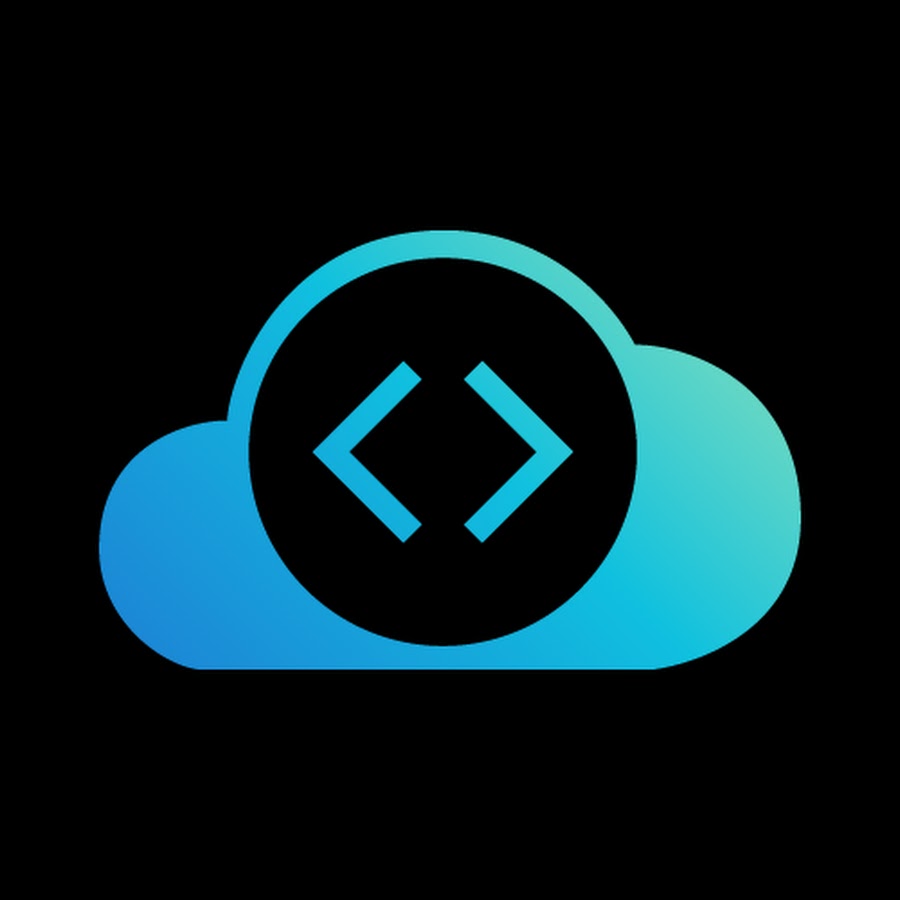
Microsoft’s documentation and learning paths are great for Azure fundamentals; AWS re:Invent videos can deepen your understanding of AWS services; Google Cloud blogs or Coursera courses can add context for GCP. Each resource might explain a concept slightly differently, and that can deepen your understanding.
Time Management and Scheduling:
Set a target exam date to avoid procrastination. Give yourself enough time (4-8 weeks for associate-level exams with daily study, perhaps longer for professional-level exams depending on your background).
📅 Step 1: Create a Study Schedule
Plan out your study time — e.g., “2 hours each weekday evening, plus a longer lab session on weekends.”
Consistency is key to long-term retention and confidence.
📚 Step 2: Ramp Up Closer to Exam
As you near exam day, focus more on reviewing high-weight topics like security, pricing, and architectural best practices.
🧘 Step 3: Exam Day Strategy
Stay calm and focused. Use smart techniques like eliminating obviously wrong answers and managing your time per question to avoid pressure.
Remember, you’re not expected to memorize every service limit – it’s about demonstrating practical understanding.
Top Preparation Tips for Each Cloud:
AWS
Focus on core services (EC2, S3, RDS, VPC, Lambda, etc.), know the AWS Well-Architected Framework principles, and be comfortable analyzing scenario questions (e.g., what’s the best architecture given certain requirements).
Use AWS’s free tier to practice building an environment. AWS’s official Exam Guides outline the domains – use them as a checklist.
Azure
Use Microsoft Learn modules for Azure; they often have interactive labs. Pay attention to Azure-specific terminology and services (for example, Azure AD, Resource Groups, etc.).
Azure exams sometimes have case studies – practice reading those quickly and pulling out the relevant info.
Since Azure has a strong enterprise focus, understanding governance (IAM roles, policies) and hybrid connectivity (ExpressRoute, VPN) can be important for the Architect exam.
GCP
Make sure to understand how GCP’s services compare to AWS/Azure (for your own clarity).
GCP exams like the PCA are known to test design questions and can be conceptual. Practice designing solutions that use multiple GCP services together (e.g., an app using Cloud Run, Pub/Sub, Cloud SQL).
Google’s Qwiklabs (now Skill Boosts) are excellent for hands-on GCP practice. Also, review GCP case studies (usually provided in the exam guide PDF for PCA) as those scenarios often appear in the exam.
🧠 Finally, mindset matters. Stay consistent, stay curious, and trust that every step forward brings you closer to your goal.
Approach your studies with curiosity – try to understand why a service works a certain way, not just what it does. This mindset will help you answer questions that you might not have seen before, because you can reason out the solutions.
Start Your Cloud Certification Journey with KodeKloud
There’s no better time than now to kickstart your cloud certification journey. Cloud computing skills are in peak demand in 2025, and by earning one of these top certifications, you’ll put yourself on the fast track to career success. Whether you choose AWS, Azure, GCP, or all three, gaining these certifications will equip you with valuable skills and open doors to exciting opportunities.
🚀 Discover the Top IT Certifications and Their Career Impact
Take a look at one of our most popular infographics that breaks down the top certifications in tech—from cloud to DevOps to security—and how they can accelerate your career growth.
Whether you're just getting started or planning your next move, this visual guide helps you understand which certifications open the most doors in the industry today.
🚀 Ready to get started?
KodeKloud is here to help you every step of the way. KodeKloud offers industry-leading training courses and hands-on labs for AWS, Azure, and Google Cloud certifications, curated by experts to ensure you gain real practical skills. Our students have aced their exams and gone on to land dream jobs – you can be next!
➤ Enroll in KodeKloud’s AWS Training – master core AWS services and architecture design through engaging lectures and challenges. Our AWS learning path covers from Cloud Practitioner basics to Solutions Architect Pro level.
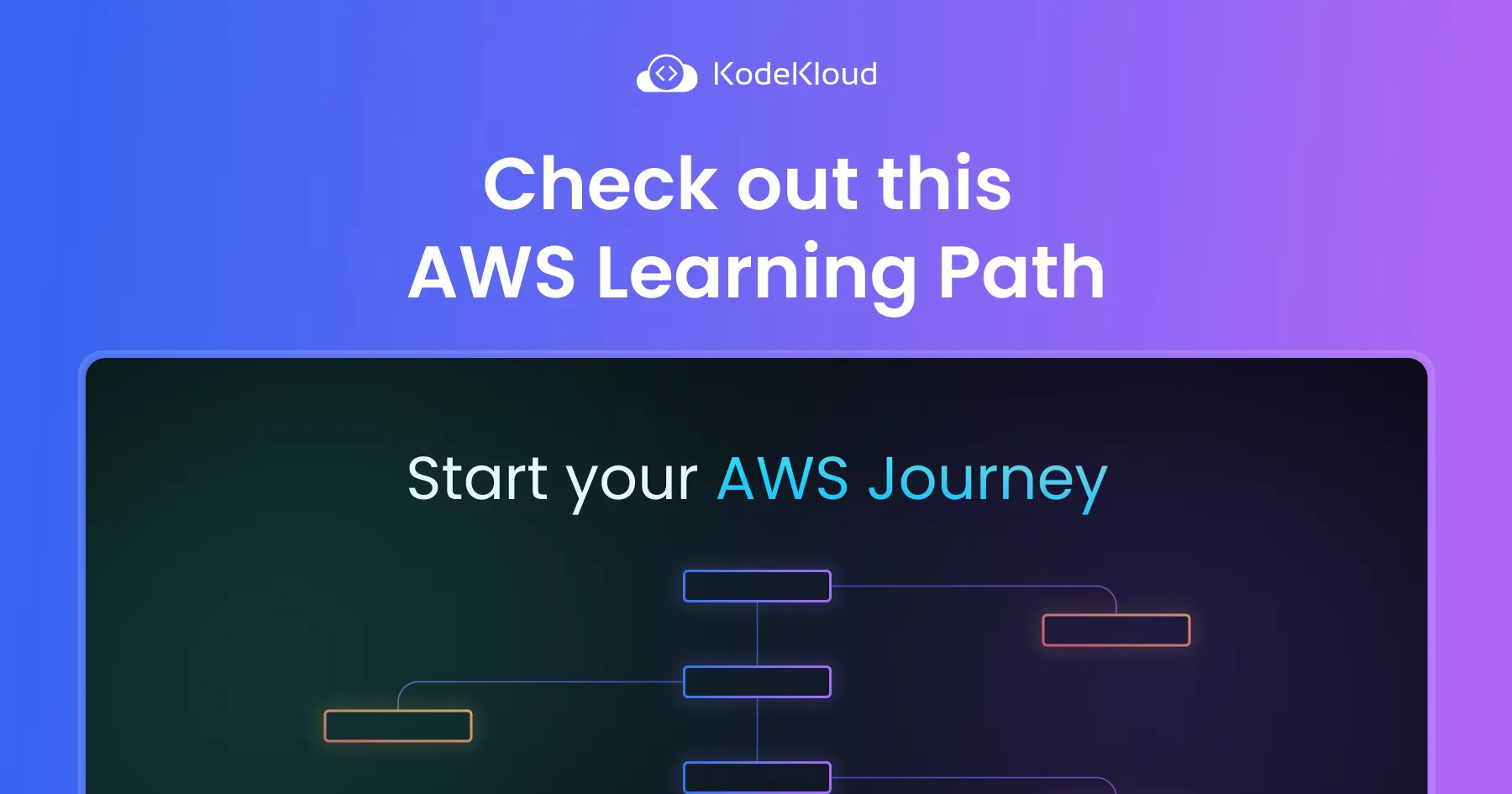
➤ Dive into KodeKloud’s Azure Certification Courses – get prepared for Azure Administrator and Solutions Architect exams with interactive labs in a real Azure environment. Understand Azure services deeply with our step-by-step guidance.
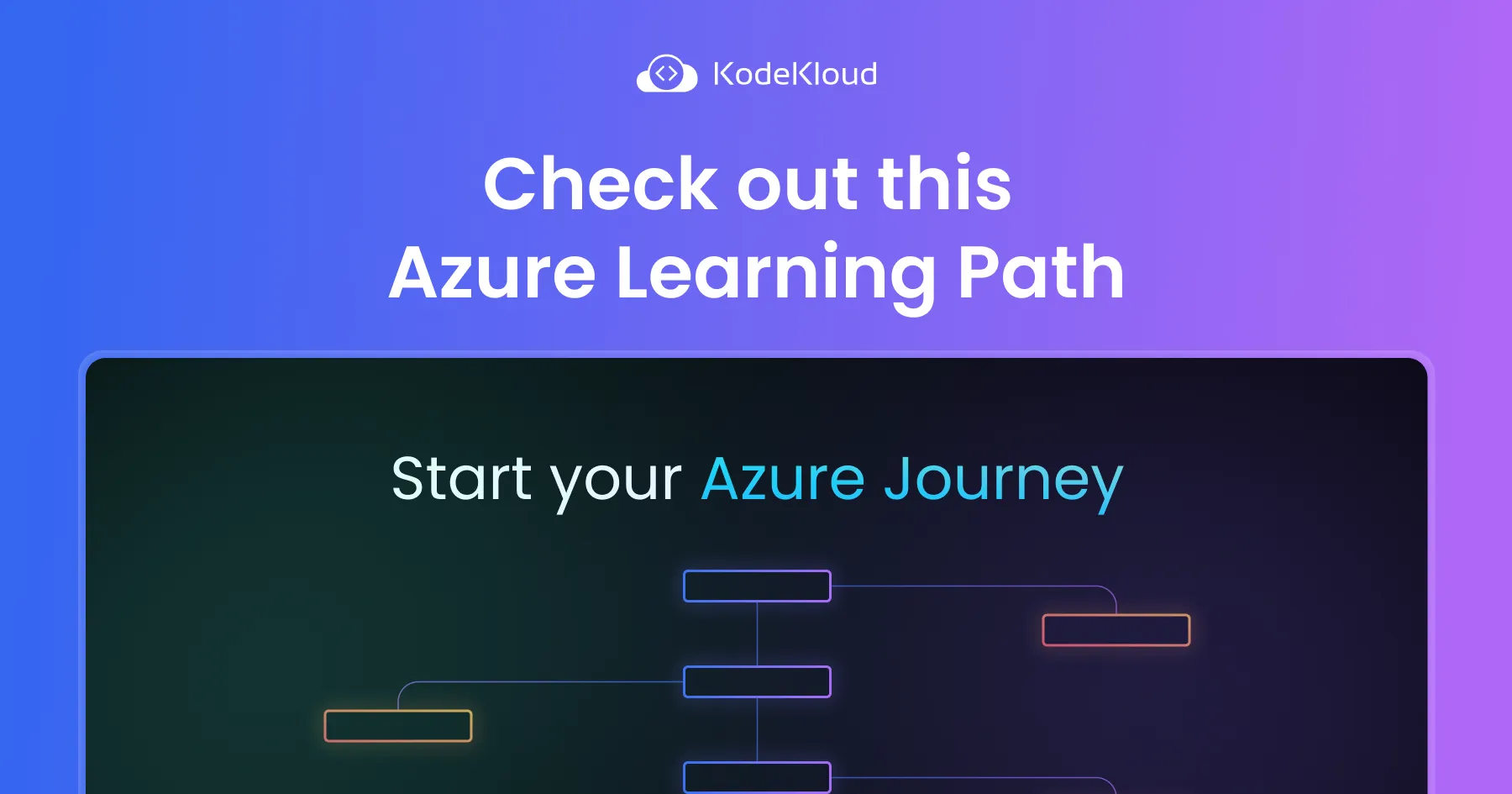
➤ Level up with KodeKloud’s GCP Certification Prep – learn Google Cloud concepts and practice deploying GCP resources so you’re confident on exam day. Our GCP courses demystify everything from IAM to Kubernetes Engine for the Professional Cloud Architect exam.

👉 Join KodeKloud now and turn your cloud certification goals into reality!
Check out our Cloud Engineer Learning Path and get on the fast track to becoming a certified cloud professional.
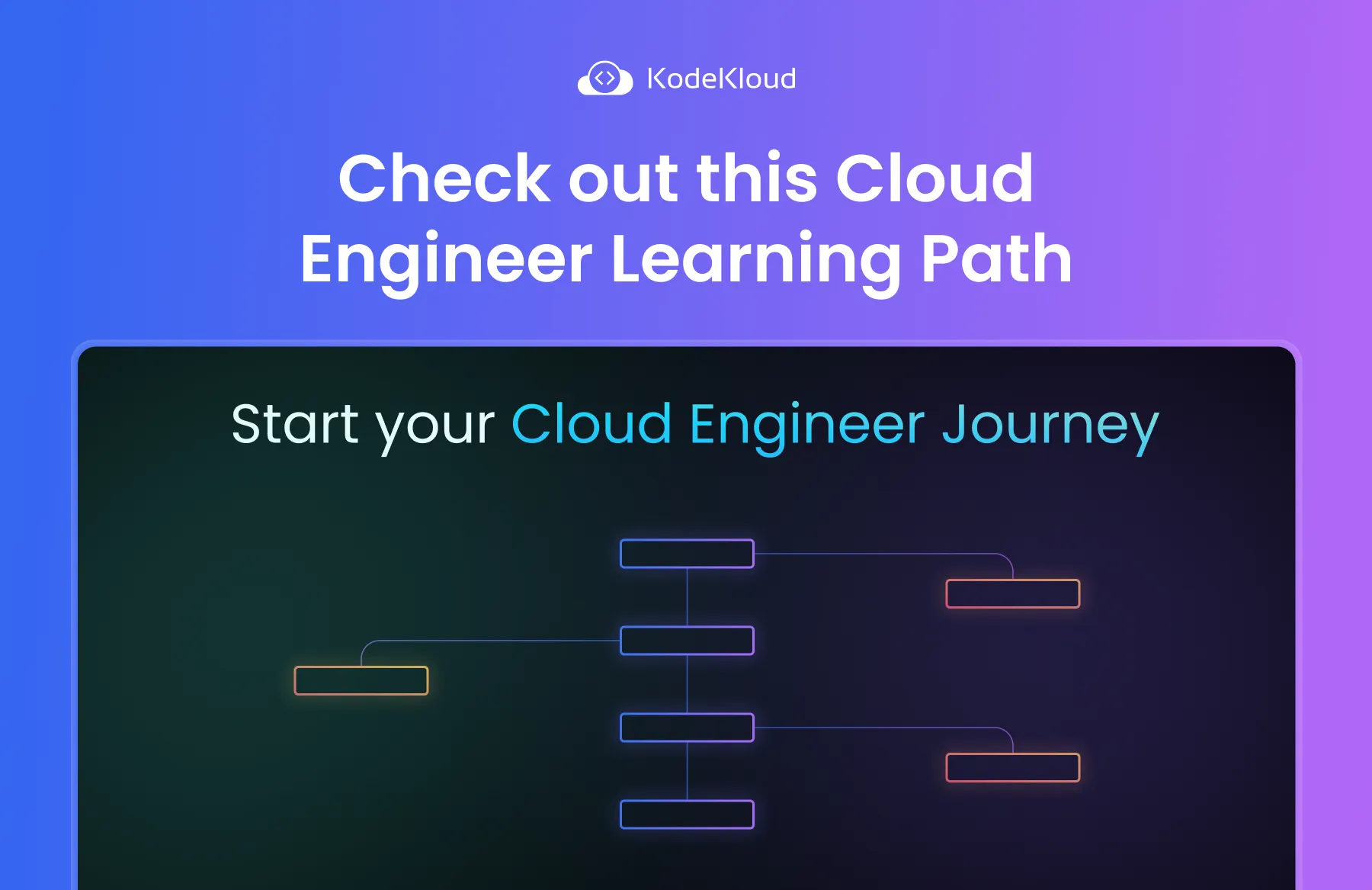
Invest in yourself, earn that certification, and step into the future of tech. The cloud revolution is here – and you have the chance to lead it. Good luck on your cloud certification journey, and we at KodeKloud can’t wait to see you succeed!
🎉 KodeKloud Free Week is LIVE!
Access premium DevOps & Cloud courses for FREE - for a limited time. Learn hands-on, sharpen your skills, and move closer to your certification goals.
Start Learning Free


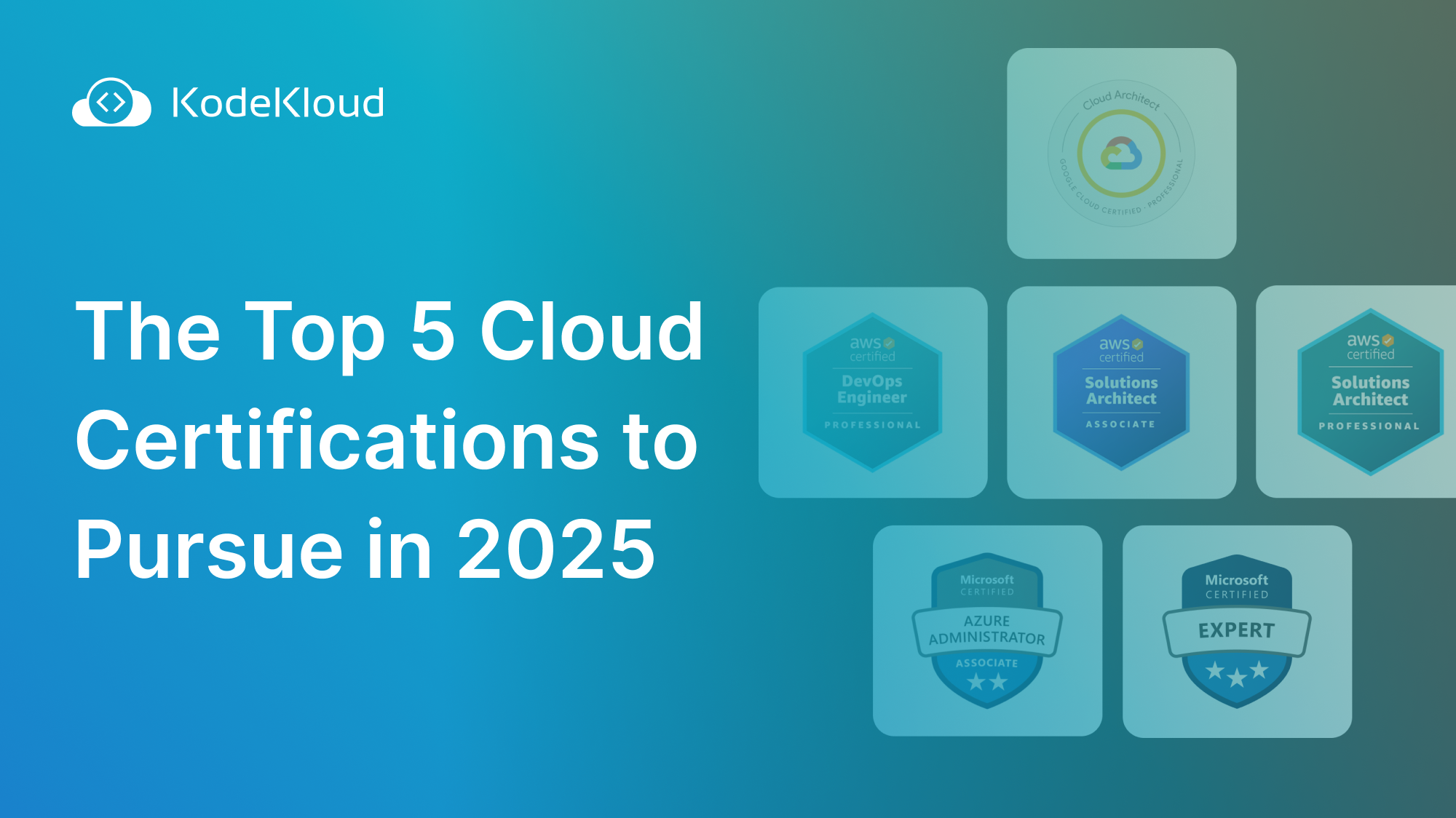





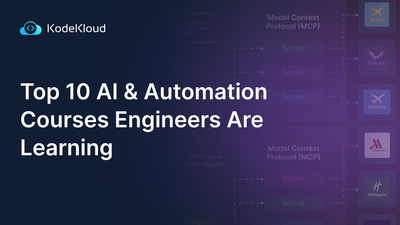
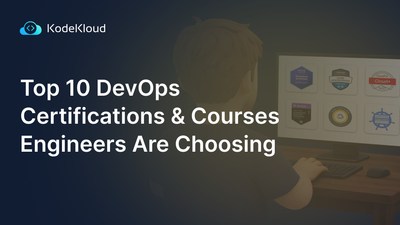

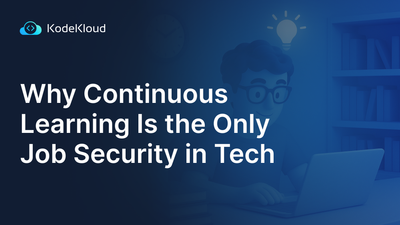

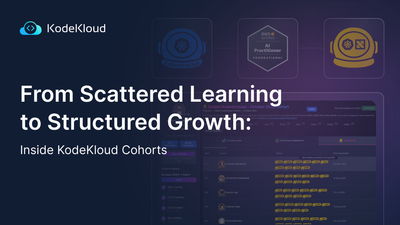
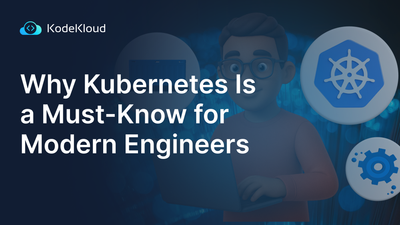

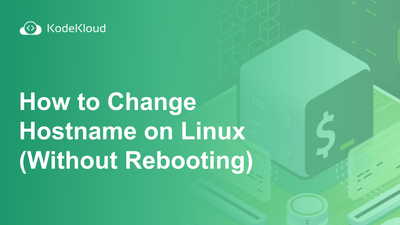


Discussion